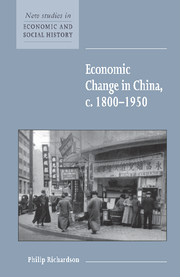Book contents
- Frontmatter
- Contents
- List of maps
- Acknowledgements
- Note on references
- Guide to pronunciation
- Dynastic chronology
- Weights and measures
- Map 1: China: provinces and cities
- Introduction
- 1 Analytical frameworks
- 2 The eighteenth-century legacy and the early nineteenth-century crisis
- 3 Growth and structural change
- 4 Foreign trade and investment
- 5 Industry: traditional and modern
- 6 Agriculture
- 7 The state and the economy
- 8 Conclusion: the legacy of the past
- Bibliography
- Index
- New Studies in Economic and Social History
- Previously published as Studies in Economic and Social History
- Economic History Society
Introduction
Published online by Cambridge University Press: 05 June 2012
- Frontmatter
- Contents
- List of maps
- Acknowledgements
- Note on references
- Guide to pronunciation
- Dynastic chronology
- Weights and measures
- Map 1: China: provinces and cities
- Introduction
- 1 Analytical frameworks
- 2 The eighteenth-century legacy and the early nineteenth-century crisis
- 3 Growth and structural change
- 4 Foreign trade and investment
- 5 Industry: traditional and modern
- 6 Agriculture
- 7 The state and the economy
- 8 Conclusion: the legacy of the past
- Bibliography
- Index
- New Studies in Economic and Social History
- Previously published as Studies in Economic and Social History
- Economic History Society
Summary
By the turn of the eighteenth century the economic expansion which had followed the Qing accession to power in the middle of the seventeenth century had begun to falter. In the early nineteenth century an impending crisis arising from a combination of internal problems which were novel in scale if not form was compounded by the effects of increasing Western intervention. Even if it was not realised at the time, it was no longer possible to progress or even contain the situation by employing exclusively traditional, Chinese, solutions. The subsequent interface between a pre-modern and still essentially traditional agrarian economy under pressure from within and the example (and the physical presence) of a modernising, industrialising West was mismanaged – by both sides. The Chinese body politic neither avoided nor embraced modernisation whilst for the West the lure of a vast Chinese market continued to outshine the reality. For a century across the late Qing and Republican periods the economy faced the conjunction of an inexorable population rise, continued Western penetration and internal political, social and military instability.
As a result, whilst in the middle of the eighteenth century China still stood as one of the most productive and technologically sophisticated economies in a pre-modern world, two centuries later it appeared as one of the more backward in a modern, industrialised era. It was, and remained, what Wrigley, in a different context, has termed an ‘advanced organic economy’ [16]. Indeed China, in many ways, represents the advanced organic economy par excellence.
- Type
- Chapter
- Information
- Economic Change in China, c.1800–1950 , pp. 1 - 5Publisher: Cambridge University PressPrint publication year: 1999



